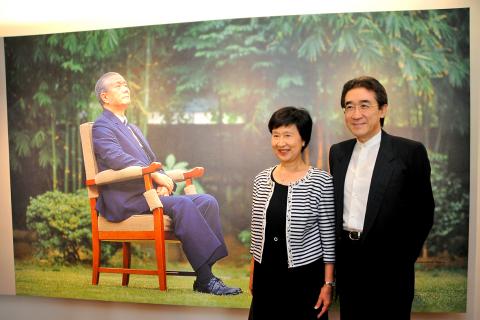A key figure in the nation’s economic development was recognized yesterday at the opening of the new Sun Yun-suan (孫運璿) Science, Technology and Humanities Memorial Museum in Taipei.
Sun was a major political figure during the nation’s “economic miracle,” serving as minister of economic affairs from 1969 to 1978 and as premier from 1978 to 1984.
He oversaw the establishment of the Hsinchu Science and Industrial Park as well as several infrastructure projects such as the Taiwan Taoyuan International Airport and the nation’s first freeway.

Photo: Liu Hsin-der, Taipei Times
President Ma Ying-jeou (馬英九) called him a “model civil servant” at a ceremony inaugurating the museum in Sun’s former residence.
The house has more than 90 years of history, combining Western and Japanese architecture.
The first floor is devoted to Sun’s life and work, while the second features seasonal exhibits. The Industrial Technology Research Institute — which Sun helped establish — is to have an interactive exhibit there until February, featuring creative uses of technology, including bicycles that can filter water and a chair that can automatically measure five different vital signs.
The museum is at No. 10, Alley 6, Chongqing S Rd Sec 2, close to the Taipei Botanical Garden, and is open from 10am to 5pm, Tuesday to Sunday.
Entrance will be free next month, after which tickets will be charged.

TRAFFIC SAFETY RULES: A positive result in a drug test would result in a two-year license suspension for the driver and vehicle, and a fine of up to NT$180,000 The Ministry of Transportation and Communications is to authorize police to conduct roadside saliva tests by the end of the year to deter people from driving while under the influence of narcotics, it said yesterday. The ministry last month unveiled a draft of amended regulations governing traffic safety rules and penalties, which included provisions empowering police to conduct mandatory saliva tests on drivers. While currently rules authorize police to use oral fluid testing kits for signs of drug use, they do not establish penalties for noncompliance or operating procedures for officers to follow, the ministry said. The proposed changes to the regulations require

The Executive Yuan yesterday announced that registration for a one-time universal NT$10,000 cash handout to help people in Taiwan survive US tariffs and inflation would start on Nov. 5, with payouts available as early as Nov. 12. Who is eligible for the handout? Registered Taiwanese nationals are eligible, including those born in Taiwan before April 30 next year with a birth certificate. Non-registered nationals with residence permits, foreign permanent residents and foreign spouses of Taiwanese citizens with residence permits also qualify for the handouts. For people who meet the eligibility requirements, but passed away between yesterday and April 30 next year, surviving family members

Taiwanese officials are courting podcasters and influencers aligned with US President Donald Trump as they grow more worried the US leader could undermine Taiwanese interests in talks with China, people familiar with the matter said. Trump has said Taiwan would likely be on the agenda when he is expected to meet Chinese President Xi Jinping (習近平) next week in a bid to resolve persistent trade tensions. China has asked the White House to officially declare it “opposes” Taiwanese independence, Bloomberg reported last month, a concession that would mark a major diplomatic win for Beijing. President William Lai (賴清德) and his top officials

The German city of Hamburg on Oct. 14 named a bridge “Kaohsiung-Brucke” after the Taiwanese city of Kaohsiung. The footbridge, formerly known as F566, is to the east of the Speicherstadt, the world’s largest warehouse district, and connects the Dar-es-Salaam-Platz to the Brooktorpromenade near the Port of Hamburg on the Elbe River. Timo Fischer, a Free Democratic Party member of the Hamburg-Mitte District Assembly, in May last year proposed the name change with support from members of the Social Democratic Party and the Christian Democratic Union. Kaohsiung and Hamburg in 1999 inked a sister city agreement, but despite more than a quarter-century of